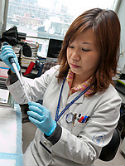Vascular endothelial growth factor enhances cancer cell adhesion to microvascular endothelium in vivo Journal Article
| Authors: | Shen, S.; Fan, J.; Cai, B.; Lv, Y.; Zeng, M.; Hao, Y.; Giancotti, F. G.; Fu, B. M. |
| Article Title: | Vascular endothelial growth factor enhances cancer cell adhesion to microvascular endothelium in vivo |
| Abstract: | To investigate whether vascular endothelial growth factor (VEGF) enhances cancer cell adhesion to normal microvessels, we used in vivo video microscopy to measure adhesion rates of MDA-MB-435s human breast cancer cells and ErbB2-transformed mouse mammary carcinomas in the postcapillary venules of rat mesentery. An individual postcapillary venule in the mesentery was injected via a glass micropipette with cancer cells either in a perfusate of mammalian Ringer solution containing 1% bovine serum albumin as a control, or with the addition of 1 nm VEGF for test measurements. Cell adhesion was measured as either the number of adherent cells or the fluorescence intensity of adherent cells in a vessel segment for ∼60 min. Our results showed that during both control and VEGF treatments, the number of adherent cells increased almost linearly with time over 60 min. The VEGF treatment increased the adhesion rates of human tumour cells and mouse carcinomas 1.9-fold and 1.8-fold, respectively, over those in control conditions. We also measured cancer cell adhesion after pretreatment of cells with an antibody blocking VEGF or an antibody blocking α6 integrin, and pretreatment of the microvessel with VEGF receptor (KDR/Flk-1) inhibitor, SU1498, or anti-integrin extracellular matrix ligand antibody, anti-laminin-5. All antibodies and inhibitor significantly reduced adhesion, with anti-VEGF and SU1498 reducing it the most. Our results indicate that VEGF enhances cancer cell adhesion to the normal microvessel wall, and further suggest that VEGF and its receptor, KDR/Flk-1, as well as integrins of tumour cells and their ligands at the endothelium, contribute to mammary cancer cell adhesion to vascular endothelium in vivo. © 2010 The Physiological Society. |
| Keywords: | vasculotropin; controlled study; treatment outcome; vascular endothelial growth factor a; human cell; microscopy; nonhuman; animal cell; mouse; animals; mice; animal tissue; breast cancer; epidermal growth factor receptor 2; fluorescence; animal model; in vivo study; dose-response relationship, drug; cell line, tumor; vasculotropin inhibitor; breast neoplasms; videorecording; extracellular matrix; vascular endothelium; endothelium, vascular; cancer cell; rat; ligand; cell count; bovine serum albumin; rats; venule; cell adhesion; alpha6 integrin; mesentery; protein antibody; kalinin; ringer solution; linear system; micropipette |
| Journal Title: | Experimental Physiology |
| Volume: | 95 |
| ISSN: | 0958-0670 |
| Publisher: | Wiley Blackwell |
| Date Published: | 2010-01-01 |
| Start Page: | 369 |
| End Page: | 379 |
| Language: | English |
| DOI: | 10.1113/expphysiol.2009.050260 |
| PUBMED: | 19880535 |
| PROVIDER: | scopus |
| PMCID: | PMC2859456 |
| DOI/URL: | |
| Notes: | --- - "Cited By (since 1996): 1" - "Export Date: 20 April 2011" - "CODEN: EXPHE" - "Source: Scopus" |
Altmetric
Citation Impact
BMJ Impact Analytics
Related MSK Work






